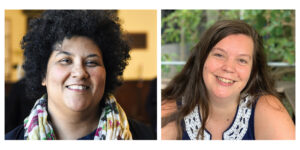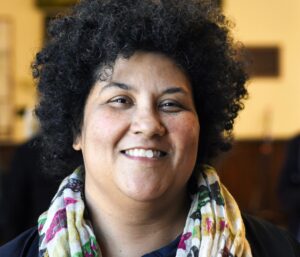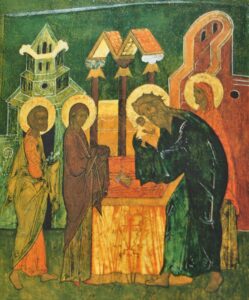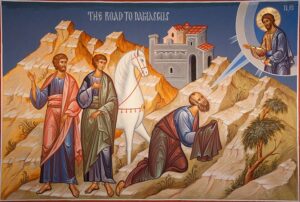Note: As we continue to pray for healing for the Rev. Canon Scott Gunn, this weekly message will feature guest writers from the Forward Movement staff and board of directors. Today’s post comes from The Rev. Elizabeth Felicetti, writer of this year’s Good Book Club weekly meditations. Read more to see how The Good Book Club has been important to her ministry, and sign up to read along with us at goodbookclub.org.
 The Good Book Club has transformed my ministry at the parish where I serve as rector, St. David’s Episcopal Church, in suburban Richmond, Virginia. As you may know, the Good Book Club invites people to read a short section of the Bible every day for a period of time. Over the years that Forward Movement has hosted the Good Book Club, thousands have read together each of the four gospels, the Book of Acts, Romans, and Exodus. This year, starting with Epiphany, Jan. 6, through Shrove Tuesday, Feb. 21, the Good Book Club will explore Ruth and Esther, two books from the Old Testament that explore the faithfulness and courage of remarkable women.
The Good Book Club has transformed my ministry at the parish where I serve as rector, St. David’s Episcopal Church, in suburban Richmond, Virginia. As you may know, the Good Book Club invites people to read a short section of the Bible every day for a period of time. Over the years that Forward Movement has hosted the Good Book Club, thousands have read together each of the four gospels, the Book of Acts, Romans, and Exodus. This year, starting with Epiphany, Jan. 6, through Shrove Tuesday, Feb. 21, the Good Book Club will explore Ruth and Esther, two books from the Old Testament that explore the faithfulness and courage of remarkable women.
Although Bible study played a large role in my own discernment to ordination, I had only offered a few short-term evening Bible studies at St. David’s until 2018, when I decided to use the Good Book Club study on Luke as a Lenten program, and then continued on with a small group to continue with Acts during the season of Easter. We had a brief eucharist each Wednesday morning followed by an hour-long study, and we loved that so much that in the fall we started again. Every year, we use whatever the Good Book Club offers and then supplement with other studies the rest of the year.
After last year’s Good Book Club, I reached out to Scott Gunn and Richelle Thompson to ask what the study would be in 2023. When they mentioned Ruth and Esther, I had so many ideas to offer that I asked if they would like me to write some of the materials! I’m still pinching myself that they said yes. This fall, I worked with the Forward Movement team to write the introductions to Ruth 101 and Esther 101 and a free, downloadable six-week study guide (available in English and Spanish). In addition, each week during the Good Book Club, I’ll write a “preview” email, looking ahead to the scripture readings and offering context and questions for reflection. (Sign up for these emails here!) I also encourage you to sign up for the (free!) live ChurchNext class led by Lindsay Hardin Freeman, author of Bible Women. As I write these materials, I was able to draw on my experiences with Ruth and Esther: in seminary, I translated Ruth as part of a small Hebrew reading class back, and I wrote about Esther in my book that comes out in August.
My approach to Bible study is different than it may be for some others. Questions about what we read might mean for our everyday lives today are equally as important to me as ancient context. I find writing a probing question similar to writing a line of poetry. I hope you won’t skip over the questions in the weekly emails or in the six-week study but will linger over them, pondering them yourselves as well as, ideally, exploring them in a community. These are not questions about how well you retained what you read, but how what you read might inform how you are living your life and how you think and reflect about daily issues. That’s my approach to teaching adults: we learn best by discussion and reflection, not regurgitation.
The Good Book Club reminds me of why I felt called to ministry more than twenty years ago. I look forward to the weekly Wednesday eucharist and Bible study each week. Being a rector often means plunging toilets, writing letters of recommendation, and signing things. What a joy to meet with a small group of people to puzzle and pray over the Bible!
I’m thrilled to be studying the Good Book with all of you!
In Christ,
Elizabeth Felicetti
The Rev. Elizabeth Felicetti is the rector of St. David’s Episcopal Church in North Chesterfield, Virginia. Her books, Unexpected Abundance and Irreverent Prayers (co-authored with the Rev. Samantha Vincent-Alexander), are forthcoming from Eerdmans.
More from our ministry:
Preorder the expanded second edition of the bestselling Bible Women
Prepare for Lent: Get your Join the Journey calendar today
Follow the story of the Bible with The Path
Support free resources like The Good Book Club: Donate today











 All of us at Forward Movement are thrilled that the Rev. Scott Gunn has returned from medical leave. For the next couple of weeks, he’ll be around our Cincinnati office, and then we expect he’ll return to frequent travel across the church as preacher, speaker, and retreat leader.
All of us at Forward Movement are thrilled that the Rev. Scott Gunn has returned from medical leave. For the next couple of weeks, he’ll be around our Cincinnati office, and then we expect he’ll return to frequent travel across the church as preacher, speaker, and retreat leader. I’m delighted to report that I’m back to work as Forward Movement’s executive director after an extended medical leave. Over the last few months, I’ve been on quite a journey. Let me say a few words about my time away, and then a few words about the future.
I’m delighted to report that I’m back to work as Forward Movement’s executive director after an extended medical leave. Over the last few months, I’ve been on quite a journey. Let me say a few words about my time away, and then a few words about the future. This January marks one year of my most consistent, most life-giving spiritual practices. Every Monday through Saturday in 2022, I’ve started my day by praying Morning Prayer with a group of friends over Zoom.
This January marks one year of my most consistent, most life-giving spiritual practices. Every Monday through Saturday in 2022, I’ve started my day by praying Morning Prayer with a group of friends over Zoom. The Good Book Club has transformed my ministry at the parish where I serve as rector, St. David’s Episcopal Church, in suburban Richmond, Virginia. As you may know, the Good Book Club invites people to read a short section of the Bible every day for a period of time. Over the years that Forward Movement has hosted the
The Good Book Club has transformed my ministry at the parish where I serve as rector, St. David’s Episcopal Church, in suburban Richmond, Virginia. As you may know, the Good Book Club invites people to read a short section of the Bible every day for a period of time. Over the years that Forward Movement has hosted the  “I became a member of the church in 2009 here in prison, and I have never had a nice Book of Common Prayer. I’m wondering if there is any way your ministry would be willing to help me get the deluxe gift edition of The Book of Common Prayer and Saint Augustine’s Prayer Book. I know those items are expensive, and I wish I had a way to pay for them, but unfortunately, I receive no funds to do so. To receive these two items would be a great blessing and will last for years to come.”– Kevin
“I became a member of the church in 2009 here in prison, and I have never had a nice Book of Common Prayer. I’m wondering if there is any way your ministry would be willing to help me get the deluxe gift edition of The Book of Common Prayer and Saint Augustine’s Prayer Book. I know those items are expensive, and I wish I had a way to pay for them, but unfortunately, I receive no funds to do so. To receive these two items would be a great blessing and will last for years to come.”– Kevin We’ve taken a look at our favorite content of 2022 from
We’ve taken a look at our favorite content of 2022 from